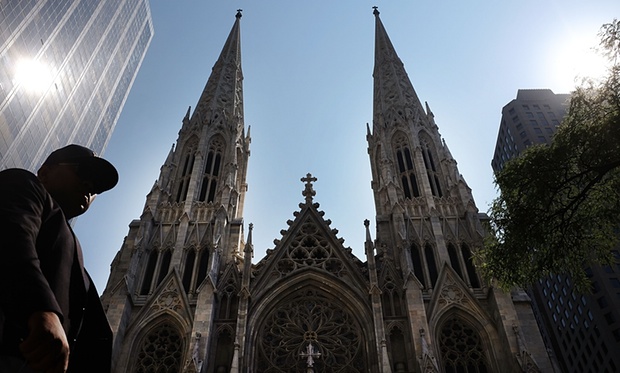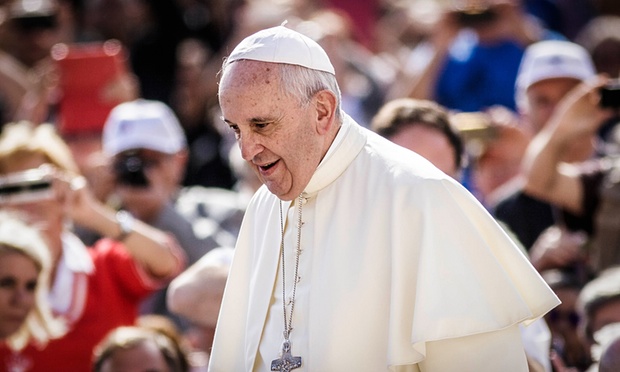Ongoing Child Sex Abuse in Catholic Church Casts Shadow on Pope's US Visit
By Amanda Holpuch
For decades, the locker rooms at Chaminade College Preparatory School in St Louis were a place of terror for several students aged 11 to 18, who as adults have filed lawsuits against the school alleging widespread sexual abuse by its staff. Former students also say they were abused in Chaminade’s boarding school rooms and staff offices. Christopher Wimmer, who says he was abused by two staff members at Chaminade for seven years, reports anger issues and problems with authority and is unable to keep a job because bosses frustrate him, along with a host of other mental and physical issues. He describes himself as “one of the good ones”, however, having seen people escorted into child sex abuse survivor support groups, unable to speak and barely able to function. “I always thought that because I hadn’t eaten a gun or jumped off a bridge that I had transcended,” Wimmer said. The story is a familiar one across the US, where the culture of child sex abuse in Catholic organizations persists. When Pope Francis arrives in the US for the first time later this month, his reputation as the beloved “people’s pope” will be clouded by the trauma endured by the thousands of people abused as children in the Catholic church. Wimmer told the Guardian that he hopes Francis is as wonderful as his reputation suggests. “But as far as this issue goes, he hasn’t done anything to give me hope,” the 56-year-old said. Using data from John Jay College of Criminal Justice’s 2011 report on sex abuse in the church, BishopAccountability.org estimates that there have been at least 17,200 victims in the US. The site warns that this is a conservative estimate.
Since Francis came to power in March 2013, he has made moves to address the clerical sex abuse problem. He created a committee in December 2013 to recommend ways to deal with the crisis and in June introduced a tribunal for bishops accused of failing to protect children. He has also become personally involved in investigations into a few sex abuse cases outside the US. The nine-member panel includes sex abuse survivors, though none of them are American. The tribunal is meant to address the demand for bishops to be held more accountable for clergy sex abuse, but it is unclear which cases the tribunal will hear, who leads the tribunal, what the standards of accountability are and howstandards are enforced. “The easiest thing has been done, it’s been announced,” said Kurt Martens, professor of canon law at the Catholic University of America. “The hard work still has to be done.” For people who have been involved with sex abuse cases in local US dioceses, the messages of humility and transparency that have endeared Francis to many people fail to show how he can do away with the cloak of secrecy that masks the Vatican’s response to the crisis. Attorney Nicole Gorovsky, who worked with Wimmer and is one of Missouri’s top clerical sex abuse attorneys, said that in recent years the local diocese has become more stubborn about working with investigators and providing documents that show what the church knows about its priests’ history. Gorovsky wants more action from Pope Francis. “He’s done a lot on a grand scale, but he’s not directing it locally,” she said. This feeling was echoed by child sex abuse survivor Peter Isely, the Midwest director of Survivors Network of Those Abused by Priests, who is based in Milwaukee. “No matter how one feels about the Pope, he has had no impact here in Milwaukee,” Isely said. Earlier this month, the Milwaukee archdiocese agreed to pay a $21m settlement to 300 victims. Up to $7m of that money will go to the victims’ lawyers and no money is being handed down to 240 victims who filed claims in the suit. A vote on the plan and final approval by the court is set for November. “It’s not a message of healing and reconciliation,” Isely said. He believes that to effect change in the child sex abuse crisis, church law needs to include a sentence that says people who sexually abuse children cannot be priests, that the Vatican needs to create a global registry of every priest that has been convicted of sex abuse and that the Church needs to improve accountability for bishops and church officials. The tribunal, which is a response to calls for increased bishop accountability, only comes into play after a child has been harmed, noted Jennifer Haselberger, who worked as the top church lawyer for the Archdiocese of St Paul and Minneapolis from August 2008 until April 2013, when she resigned in protest over what she saw as a mishandling of accusations of clergy sex abuse. Haselberger’s resignation triggered police intervention and a major investigation by Minnesota Public Radio, which revealed that three archbishops moved priests who were known to have sexually abused children to different churches instead of dismissing them. Police say the church has not been cooperative. “I think the way [the diocese] would say is ‘it’s in everybody’s best interest to keep things quiet,’” Haselberger said. “Well that’s probably true unless you consider everybody is also the kids and the parents who could be harmed. They were not a part of the equation.” She said that the 2002 Bishop’s charter on the protection of children, which was most recently revised in 2011, offers a robust set of guidelines on how to prevent child sex abuse in the church, but time and again, falls apart at the local level. Under the charter, each diocese is required to do several things including create a review board, designate a parish contact for sex abuse claims and report allegations of sex abuse to public authorities. “The church has developed procedures that should eliminate abuse in 99% of cases,” Haselberger said. “There is always going to be a person you can’t identify, but none of the cases you hear about recently are those cases.” The problem, she said, is that Francis has inherited a culture where these policies are not being followed through. Priests accused of sex abuse have been able to move to other states and countries and receive money from local diocese. “In all the cases that are coming, there is a whole history of information that just was not adequately considered before making decisions,” Hasalberger said. “The abuse cases we have had since 2002 have by and large been a human error on the part of the administration.” Those affected by abuse, like Wimmer, are still seeking answers and compensation for the long-lasting effects of his childhood trauma. The two men he said abused him have died and the statute of limitations precludes him from taking any legal action. But he has had repeated conversations with the top leader of the US Marianists congregation, which run Chaminade and happen to be based in St Louis, where Wimmer still lives. He said that Provincial Martin Solma offered him some money to cover therapy, but only if Wimmer would sign a release. He refused. Solma said in an email: “We have not required a release of any kind for any counseling or assistance given to anyone.” He said counseling services have been offered to everyone that requested it, regardless on whether their claims had been proven true or not. “I find abuse of any sort, especially sexual abuse of children, abhorrent,” Solma said. “I very much regret, and apologize for, the harm that this has caused to anyone in our ministries. Today, all of our sponsored ministries comply with strict standards of conduct, putting the security and safety of children and young people as top priority.” Last week, Wimmer emailed Solma to ask again for compensation for therapy and to discuss what assistance the church could provide. “It’s one thing to say this is sex abuse that happened 35 years ago,” said Wimmer. “I am in an email chain with a man who knows my story and knows my personal problems – right now.” Some of the people having the most difficult time recovering from the trauma are his friends from Chaminade, who he remains in touch with despite their problems with alcoholism, unemployment and drug abuse. He says two of his friends killed themselves because of the abuse they suffered. He said his wife, the first person he spoke with about his abuse, asks why he keeps some of the more self-destructive people in his life. “It’s like being in the service, we’ve been through hell together,” Wimmer said.
|
.
Any original material on these pages is copyright © BishopAccountability.org 2004. Reproduce freely with attribution.

